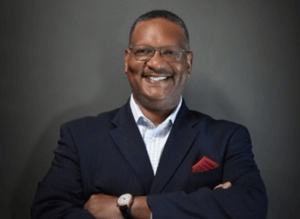And Now a Word With … Marcus Hill, on Resolving Conflicts Before They Lead to Litigation
By Michael Rhoads, August 18, 2021
‘She hit me!’ ‘Don’t touch me!’ ‘I’m not touching youuu…’ ‘You’re so annoying!’
My children are now out of diapers and forming their own opinions and developing their own interests. Among the three of them, they are a fun-loving, carefree bunch. But no matter how much they love each other, the occasional argument over the new toy, or simply vying for mom and dad’s attention can get heated from time to time. My wife or I will step in to resolve these little spats, and then we move on with our day.
Conflict is unavoidable at any age. Even after we’ve grown up and start our careers, there will always be someone you work with who may pose a greater challenge than others. I recently spoke to Marcus Hill (pictured above), FELTG instructor and Principal of Hill Management Consultancy (HMC) LLC, about his experiences related to conflict management over his 37-year career in the Federal civil service.
MR: What is the most common type of conflict in the workplace?
MH: In my experience, the most common type of conflict in the workplace relates to assignment or task interdependences in which employees must coordinate, interface or team to accomplish them. Think about it. If you are a part of a work unit in which your job responsibilities typically require you to perform independently, no problem. However, if what you do requires you to interface, coordinate, rely upon or team with others, that just might be a problem.
MR: How can you promote a more harmonious environment for all?
MH: I will respond to this question from the standpoint of any employee within a working environment, whether non-supervisory or supervisory. I believe it is imperative to possess and demonstrate the ability to effectively lead oneself first, in the workplace. Let’s unpack that a little. It starts with understanding yourself and how you relate to others. Being knowledgeable of and practicing emotional intelligence. Also having an awareness of your personality type and sense for others in the workplace can also be beneficial to harmonizing employee engagements. By demonstrating behaviors you desire others to emulate, you have an opportunity to influence co-workers’ actions from wherever you are in the organization. Simply put, “walk the talk.” Typically, high-performing, harmonious organizations are saturated with employees that have invested in the organization’s vision, actively engaged in achieving its mission and aligned behaviorally with the business unit’s core values.
MR: Is there a one-size-fits-all approach to conflict management?
MH: Based on the various natures and intricacies related to conflict, I don’t believe there is a one-size-fits-all approach managing them. However, there are proven strategies, methodologies and processes that can be used to effectively address conflict. I will be addressing some of these in my upcoming training delivery, Resolving Conflicts Before They Lead to Litigation!
MR: What is the best tool in your toolbox for managing conflict between employees?
MH: Active listening is the most effective tool for managing conflict between employees. To quote Dr. Stephen Covey: “Seek to understand before being understood.” By exercising active listening during conflict, the parties have the best opportunity to identify and address the specific, not perceived, issue(s) at dispute. Many times, the parties are focused more on defensive posturing to justify their actions in response to what they perceive the problem to be, reacting on filtered information. The goal is to be cognizant of the symptoms stemming from the conflict but focus on identifying and addressing the root cause creating it.
MR: What role does management play in resolving disputes between co-workers?
MH: Management plays a primary role in resolving disputes between co-workers. By creating a working environment that establishes an organizational culture, reflective of values, that promote harmony, managers can set the tone for healthy debate instead of unproductive disputes.
Be more effective in resolving conflict at your agency! Join Marcus on Wednesday, September 30 from 11:15-12:30 PM ET for Resolving Conflicts Before They Lead to Litigation. Click here to view our other courses during Federal Workplace Week 2021: Accountability, Challenges and Trends.
Stay safe. And remember, we’re all in this together. Rhoads@FELTG.com
